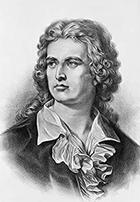
Johann Christoph Friedrich Schiller (from 1802 von Schiller; Marbach am Neckar, November 10, 1759 - Weimar, May 9, 1805) was a German poet, playwright, philosopher, historian, and publisher. He is considered, along with Goethe, the most important playwright in Germany, as well as one of the central figures of Weimar classicism. Many of his plays belong to the usual repertoire of theater in German. His ballads are among the most famous poems. His Ode to Joy was incorporated by Ludwig van Beethoven in his ninth symphony.
Schiller lived during the transition from absolutism to the bourgeoisie, the time of the French Revolution. Because the bourgeoisie could not articulate itself politically within the absolutism of the small states that formed Germany, literature became, from the second half of the 18th century, its main means of expression. The pathos and sensitivity in Schiller's works until 1785 are an expression of the development of the human, a principle that is opposed to the desire for aristocratic domination. Bourgeois tragedy as the main format, in addition to the humanity / domination opposition in the first dramas up to Kabale und Liebe, reflect this thought.
In February 1805 Schiller became seriously ill and on May 1 he met Goethe for the last time on his way to the theater. Friedrich Schiller died on May 9 in Weimar of pneumonia probably caused by his tuberculosis.




